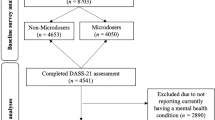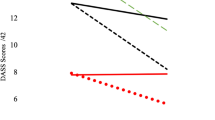Abstract
OBJECTIVE: To determine if method of weight loss (surgery; non-surgery) is associated with current levels of psychosocial functioning or current weight maintenance behaviors in individuals who have lost large amounts of weight.
DESIGN: Subjects were 67 cases and 67 controls selected from the National Weight Control Registry, a longitudinal study of individuals successful at long-term maintenance of weight loss. Cases had initially lost weight through bariatric surgery while controls had lost weight through non-surgical means. The current psychosocial functioning and weight maintenance behaviors of cases and controls were assessed and compared.
RESULTS: Cases and controls were matched on gender, current weight and total weight loss. Surgical cases reported significantly higher fat intake and lower physical activity levels. There were no differences in cases’ and controls’ reports of the impact of weight loss on other areas of their lives, neither were there differences on measures of depression or binge-eating.
CONCLUSIONS: Reported improvement in psychosocial functioning did not depend upon how weight was initially lost, but cases and controls appear to be using very different behaviors to maintain their weight losses.
This is a preview of subscription content, access via your institution
Access options
Subscribe to this journal
Receive 12 print issues and online access
$259.00 per year
only $21.58 per issue
Buy this article
- Purchase on Springer Link
- Instant access to full article PDF
Prices may be subject to local taxes which are calculated during checkout

Similar content being viewed by others
References
NIH Consensus Development Conference . Gastrointestinal surgery for severe obesity: National Institutes of Health Consensus Development Conference Statement Am J Clin Nutr 1992 55: 615S–619S.
Sugerman HJ, Starkey J, Birkenhauer R . A randomized trial of gastric bypass versus vertical banded gastroplasty for morbid obesity and their effects on sweets versus non-sweets eaters Ann Surg 1987 205: 613–624.
Sugerman HJ, Londrey GL, Kellum JM et al.Weight loss with vertical banded gastroplasty and roux-en-Y gastric bypass for morbid obesity. Selective versus random assignment Am J Surg 1989 157: 93–102.
Karlsson J, Sjostrom L, Sullivan M . Swedish obese subjects (SOS)—an intervention study of obesity. Two-year follow-up of health-related quality of life (HRQL) and eating behavior after gastric surgery for severe obesity Int J Obes 1998 22: 113–126.
Kral JG, Sjostrom LV, Sullivan MBE . Assessment of quality of life before and after surgery for severe obesity Am J Clin Nutr 1992 55: 611S–614S.
Larsen F . Psychosocial function before and after gastric banding surgery for morbid obesity. A prospective psychiatric study Acta Psychiatr Scand 1990 82 (Suppl): 1–57.
Halmi KA, Stunkard AJ, Mason EE . Emotional responses to weight reduction by three methods: gastric bypass, jejunoileal bypass, diet Am J Clin Nutr 1980 33: 446–451.
Stunkard AJ, Stinnett JL, Smoller JW . Psychological and social aspects of the surgical treatment of obesity Am J Psychiatr 1986 143: 417–429.
Wing RR, Epstein LH, Marcus MD, Kupfer DJ . Mood changes in behavioral weight loss programs J Psychosom Res 1984 28: 189–196.
Klem ML, Wing RR, McGuire MT, Seagle HM, Hill JO . A descriptive study of individuals successful at long-term maintenance of substantial weight loss Am J Clin Nutr 1997 66: 239–246.
McGuire MT, Wing RR, Klem ML, Lang W, Hill JO . What predicts weight regain among a group of successful weight losers? J Consult Clin Psychol 1999 67: 177–185.
Block G, Woods M, Potosky A, Clifford C . Validation of a self-administered diet history questionnaire using multiple diet records J Clin Epidemiol 1990 43: 1327–1335.
Stunkard AJ, Messick S . The three-factor eating questionnaire to measure dietary restraint, disinhibition and hunger J Psychosom Res 1985 9: 71–83.
Paffenbarger RS, Wing AL, Hyde RT . Physical activity as an index of heart attack risk in college alumni Am J Epidemiol 1978 108: 161–175.
Siconolfi SF, Lasater TM, Snow RCK, Carleton RA . Self-reported physical activity compared with maximal oxygen uptake Am J Epidemiol 1985 122: 101–105.
Radloff LS . The CES-D scale: a self-report depression scale for research in the general population Appl Psychol Meas 1977 1: 385–401.
Cooper Z, Fairburn CG . The Eating Disorder Examination: a semi-structured interview for the assessment of the specific psychopathology of eating disorders Int J Eating Disord 1987 6: 1–8.
American Psychiatric Association . Diagnostic and statistical manual of mental disorders (4th ed.) APA: Washington, DC 1994.
Schoeller DA . Limitations in the assessment of dietary intake by self-report Metab Clin Exp 1995 44: 18–22.
Lichtman SW, Pisarska K, Berman ER, Pestone M, Dowling H, Offenbacher E, Weisel H, Heshka S, Matthews DE, Heymsfield SB . Discrepancy between self-reported and actual caloric intake and exercise in obese subjects N Engl J Med 1992 327: 1893–1898.
Black AE, Prentice, AM, Goldberg GR, Jebb SA, Bingham SA, Livingstone MB, Coward WA . Measurements of total energy expenditure provide insights into the validity of dietary measurements of energy intake J Am Diet Assoc 1993 93: 572–579.
Black AE, Bingham SA, Johansson G, Coward WA . Validation of dietary intakes of protein and energy against 24 hour urinary N and DLW energy expenditure in middle-aged women, retired men and post-obese subjects: comparisons with validation against presumed energy requirements Eur J Clin Nutr 1997 51: 405–413.
Flancbaum L, Choban PS, Bradley LR, Burge JC . Changes in measured resting energy expenditure after Roux-en-Y gastric bypass for clinically severe obesity Surgery 1997 122:: 943–949.
Boozer CN, Choban PS, Atkinson RL . Ileal transposition surgery attenuates the increased efficiency of weight gain on a high-fat diet Int J Obes 1990 14: 869–878.
Gatz M, Hurwicz ML . Are older people more depressed? Cross-sectional data on center for epidemiological studies depression scale factors Psychol Aging 1990 5: 284–290.
Jones-Webb RJ, Snowden LR . Symptoms of depression in blacks and whites Am J Epidemiol 1993 83: 240–244.
Woods NF, Mitchell ES . Patterns of depressed mood in midlife women: observations from the Seattle midlife women's health study Res Nurs Health 1996 19: 111–123.
Friedman MA, Brownell KD . Psychological correlates of obesity: moving to the next research generation Psychol Bull 1995 117: 3–20.
Author information
Authors and Affiliations
Corresponding author
Rights and permissions
About this article
Cite this article
Klem, M., Wing, R., Chang, CC. et al. A case–control study of successful maintenance of a substantial weight loss: individuals who lost weight through surgery versus those who lost weight through non-surgical means. Int J Obes 24, 573–579 (2000). https://doi.org/10.1038/sj.ijo.0801199
Received:
Revised:
Accepted:
Published:
Issue Date:
DOI: https://doi.org/10.1038/sj.ijo.0801199
Keywords
This article is cited by
-
Bariatric Surgery in Adults with Obesity: the Impact on Performance, Metabolism, and Health Indices
Obesity Surgery (2021)
-
Keeping the Weight Off: Physical Activity, Sitting Time, and Weight Loss Maintenance in Bariatric Surgery Patients 2 to 16 Years Postsurgery
Obesity Surgery (2014)
-
Residual Obesity Stigma: An Experimental Investigation of Bias Against Obese and Lean Targets Differing in Weight‐Loss History
Obesity (2012)
-
Medical and Psychosocial Outcomes of Laparoscopic Roux-en-Y Gastric Bypass: Cross-sectional Findings at 4-Year Follow-up
Obesity Surgery (2012)
-
High‐Volume Exercise Program in Obese Bariatric Surgery Patients: A Randomized, Controlled Trial
Obesity (2011)



